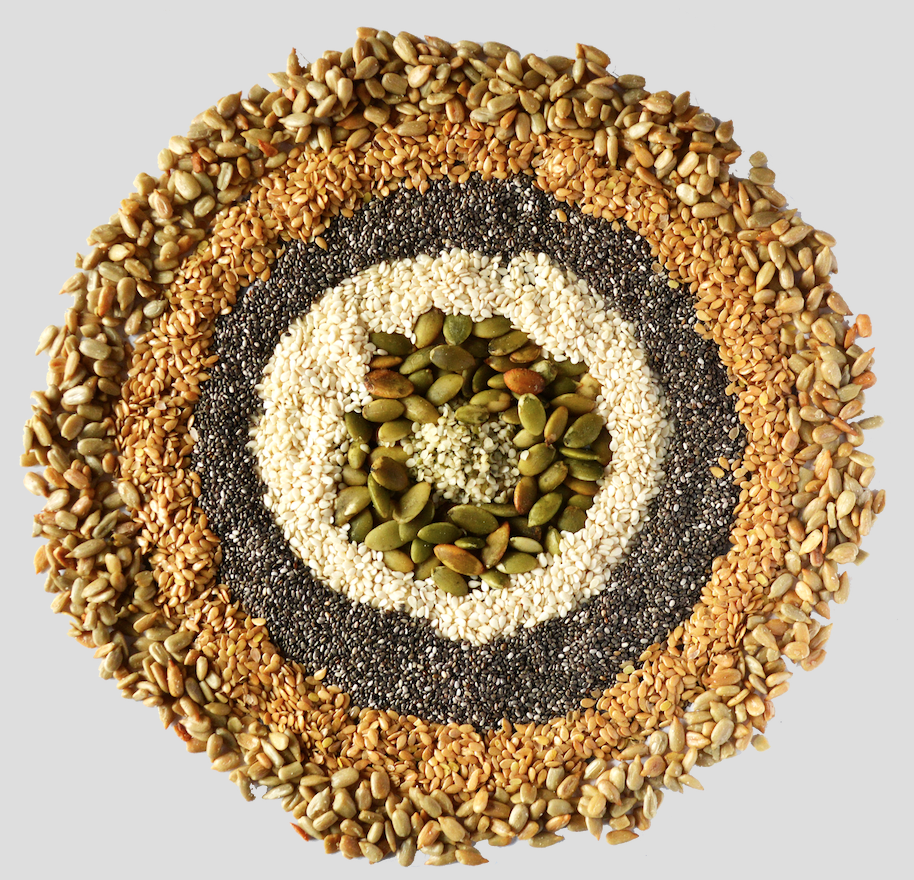It seems seeds are all the rage these days. From tiny chia seeds to larger pumpkin seeds, there are so many choices! Don’t let their tiny package fool you — seeds boast a host of health benefits and are full of nutrition.
With numerous studies citing the health benefits of nuts and seeds, consumers are choosing these foods more often. According to Transparency Market Research, the global market for seeds is expected to rise from a revenue-wise value of $64.5 billion in 2015 to $114 billion by 2021. The growing popularity of seeds has prompted many food-manufacturing companies to add them to standard food products like crackers, waffles, cereals and other baked goods. The versatility of seeds in food production leads to more choices for the consumer. We can eat our seeds whole or enjoy them as seed butter, oil, flour or even milk! Seeds have also become popular among those with peanut and other nut allergies as they can enjoy many of the same health benefits of nuts without exposing themselves to a dangerous reaction.
When it comes to nutrition, include a variety of seeds in your diet to reap the benefits of all the vitamins, minerals and antioxidants they offer!
| Seed | Calories per 1 oz serving | Protein per 1 oz serving | Fat per 1 oz serving | Fiber per 1 oz serving | Nutritional Highlights |
| Chia | 138 | 5 g | 9 g | 10 g | A great source of the omega-3 fatty acid ALA. Higher in fiber than other seeds, a serving of chia seeds can help curb hunger and aid in weight loss. The fiber also helps to keep bowels regular. |
| Flax | 151 | 5 g | 12 g | 8 g | A rich source of plant lignans, a polyphenol that aids in hormone balancing. Make sure to choose ground flax; our bodies do not break down whole flaxseed meaning we miss out on the nutrients. |
| Hemp | 159 | 9 g | 12 g | 3 g | A rich source of protein, with 23 percent of total calories coming from protein. Also, a great source of GLA (Gamma-linolenic acid), a fat that helps promote healthy blood lipid levels. |
| Sunflower | 165 | 6 g | 15 g | 2 g | High in vitamin E, an antioxidant nutrient promoting health of the skin and vascular system. |
| Sesame | 162 | 5 g | 14 g | 3 g | A surprising source of calcium with 276 mg per serving (almost as much as a glass of milk!) |
| Pumpkin | 163 | 8 g | 14 g | 2 g | Excellent source of phosphorus, the second most abundant mineral in the body, essential for bone health. Also high in zinc, promoting good immune function. |
Ready to try some seeds? Visit the bulk section of your supermarket or health food store to explore the endless choices of bulk nuts and seeds. This is the perfect way to customize the amount you purchase and try a variety.
10 ways to add seeds to your diet
- Substitute ¼ cup of flour in a muffin recipe for ¼ cup ground flax seed.
- Add a tablespoon of chia seeds to your daily yogurt snack for extra crunch
- Make a mixed seed and nut granola that can eaten as a snack or used as a topping for yogurt and baked fruit crisps
- Top salads with toasted pumpkin seeds for a nutty and flavorful crunch
- Make a chia seed pudding for a nutritious snack to satisfy your sweet tooth
- Use sunflower seed butter as a substitute for peanut butter and use as a dip for apples or banana slices.
- Coat raw tuna steaks with sesame seeds prior to pan searing.
- Use tahini paste (ground sesame seeds) as a base for salad dressings and dips
- Add 3 tablespoons of hemp seeds to your smoothie for 10 grams of protein
- Add a tablespoon of ground flax and a tablespoon of chia to your oatmeal to add filling fiber
Related Articles:
Snackification… the new way to eat!

